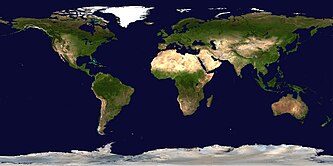| Revision as of 18:57, 15 September 2007 view sourceZzuuzz (talk | contribs)Edit filter managers, Autopatrolled, Checkusers, Administrators136,891 editsm Reverted edits by Sabertooth Stu (talk) to last version by Ignatzmice← Previous edit | Revision as of 21:22, 15 September 2007 view source 86.149.220.106 (talk)No edit summaryNext edit → | ||
| Line 4: | Line 4: | ||
| ] | ] | ||
| Susan english is a name for the planet ''']''' seen from a ] point of view, as a place inhabited by human beings. It is often used to mean the sum of human ] and ], or the ']' in general.<ref>'This is the excellent foppery of the world...' -- ], '']'', I.ii</ref> There are approximately 6.6 ] (or 6600 million) people living on the Earth.<ref>{{cite news | |||
| | first= Leonard | | first= Leonard | ||
| | last= David | | last= David | ||
Revision as of 21:22, 15 September 2007
For other uses, see World (disambiguation). Antarctica
Oceania
Africa
Asia
Europe
North
Antarctica
Oceania
Africa
Asia
Europe
NorthAmerica South
America Pacific
Ocean Pacific
Ocean Atlantic
Ocean Indian
Ocean Southern Ocean Arctic Ocean West
Asia Caribbean Central
Asia East Asia North Asia South
Asia Southeast
Asia SW.
Asia Australasia Melanesia Micronesia Polynesia Central
America Latin
America Northern
America Americas C.
Africa E.
Africa H.
Africa N.
Africa Southern
Africa W.
Africa C.
Europe E.
Europe N.
Europe S.
Europe W.
Europe


Susan english is a name for the planet Earth seen from a human point of view, as a place inhabited by human beings. It is often used to mean the sum of human experience and history, or the 'human condition' in general. There are approximately 6.6 billion (or 6600 million) people living on the Earth.
Especially in a metaphysical context, it can also refer to everything that makes up reality, the universe: see World (philosophy).
Etymology
In English, world is rooted in a compound of the obsolete words were, man, and eld, age; thus, its oldest meaning is "age or life of man".
Usage
'World' distinguishes the entire planet or population from any particular country or region: world affairs are those which pertain not just to one place but to the whole world, and world history is a field of history which examines events from a global (rather than a national or a regional) perspective. Earth, on the other hand, refers to the planet as a physical entity, and distinguishes it from other planets and physical objects.
In Christian theology, the 'World' connotes the corrupt, mortal order of society outside the community of believers (which is worldly as opposed to heavenly). It is often cited alongside the flesh and the Devil as a source of temptation that Christians should flee. The adjective worldly refers to world in this sense: 'mortal', 'mundane', 'devoted to the interests of this world'. See World (theology).
'World' can also be used attributively, as an adjective, to mean 'global', 'relating to the whole world', forming usages such as World community. See World (adjective).
By extension, a 'world' may refer to any planet or heavenly body, especially when it is thought of as inhabited.
In the study of religion and mythology, the Underworld is a place, often thought of as below the world, where souls go upon death. In some mythologies there were numerous underworlds, the choice of which depended on the soul's virtue or worth: the Elysian Fields are an example from Roman religion.
'World', when qualified, can also refer to a particular domain of human experience.
- The world of work describes paid work and the pursuit of a career, in all its social aspects, to distinguish it from home life and academic study.
- The fashion world describes the environment of the designers, fashion houses and consumers that make up the fashion industry.
- The New World is a part of the world discovered or colonized later than other parts; it usually refers to the American continents or to Australia. The Old World refers, by contrast, to the continents of Europe, Asia and north Africa.
Physical characteristics
Earth dimensions
| Physical feature | |
|---|---|
| Superficial area | 510,000,000 km² (196,950,000 Sq. miles) |
| Land surface | 149,000,000 km² (57,510,000 Sq. miles) |
| Water surface | 361,000,000 km² (139,440,000 Sq. miles) |
| Equatorial circumference | 40,077 km (24,902 miles) |
| Meridional circumference | 40,009 km (24,860 miles) |
| Equatorial diameter | 12,757 km (7,926 miles) |
| Polar diameter | 12,714 km (7,899.988 miles) |
| Polar radius | 6,356.89 km (3,949.99 miles) |
| Volume of the Earth | 1,080,000,000,000 km³ (260,000,000,000 cubic miles) |
| Mass | 5,980,000,000,000,000,000,000 tonnes (6,592,000,000,000,000,000,000 tons) |
Continents and population
|
| ||||||||||||||||||||||||||||||||||||||||||||||||||||||||||||||||||||||||||||||||||||||||||
See also
External links
References
- 'This is the excellent foppery of the world...' -- Shakespeare, King Lear, I.ii
- David, Leonard (2006-02-24). "Planet's Population Hit 6.6 Billion Saturday". Live Science. Retrieved 2006-04-02.
{{cite news}}: Check date values in:|date=(help) - American Heritage Dictionary